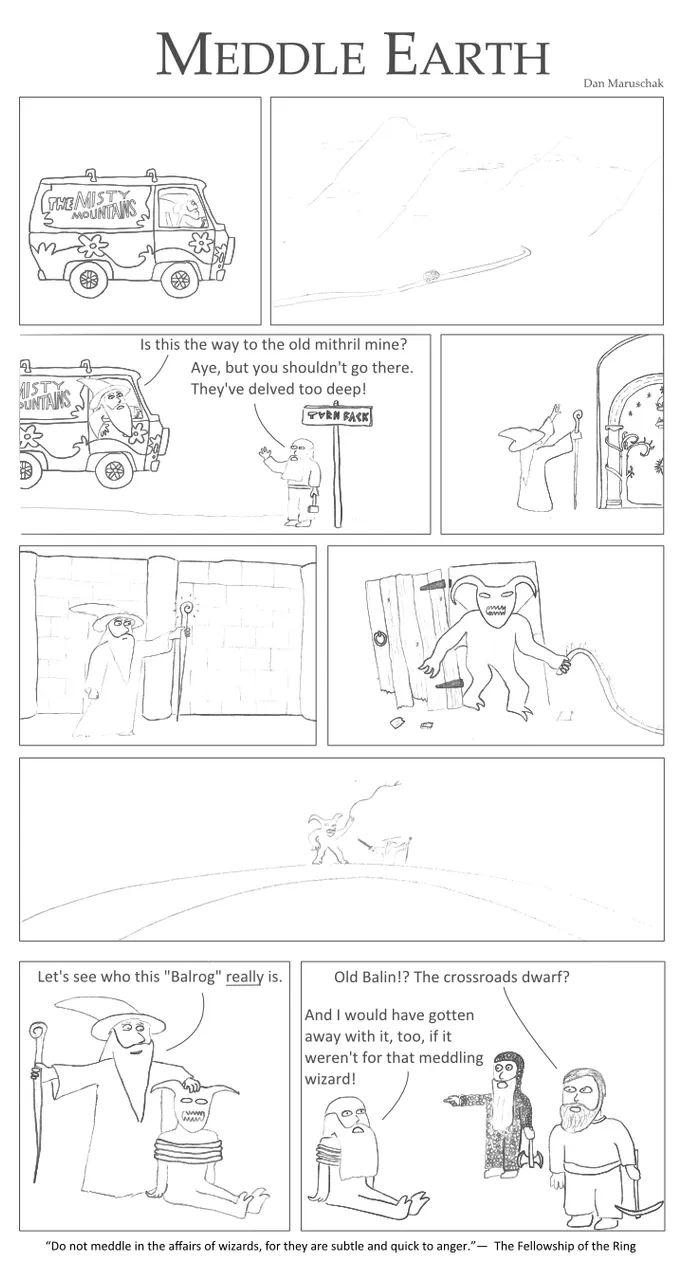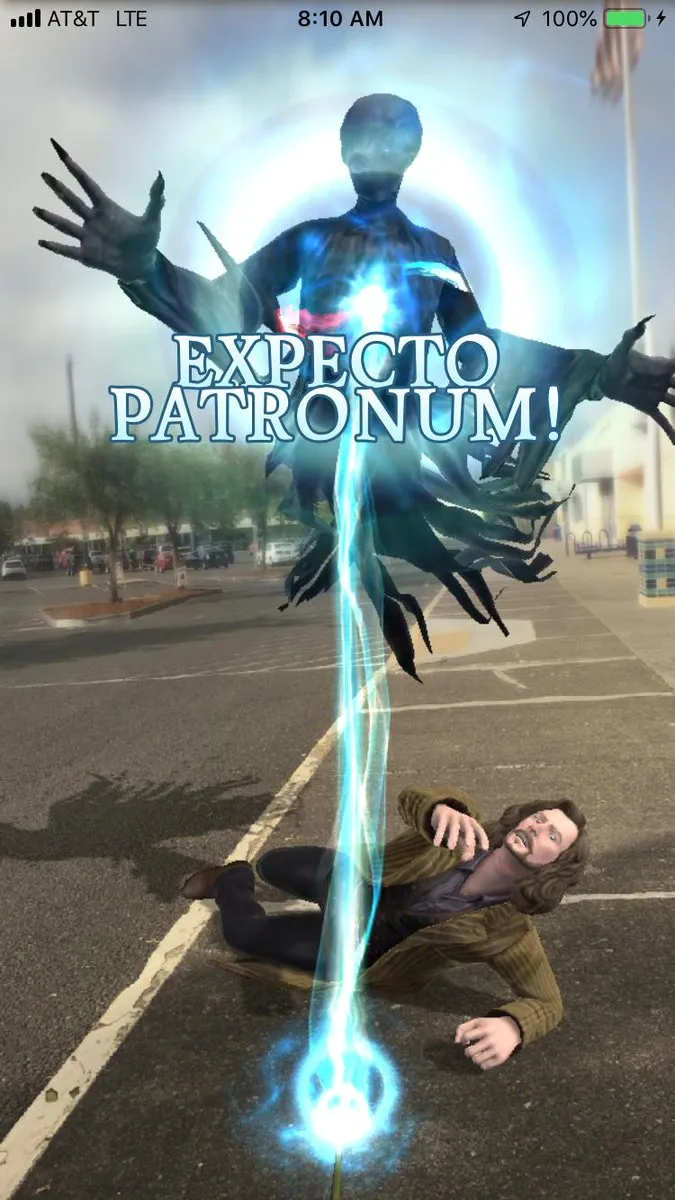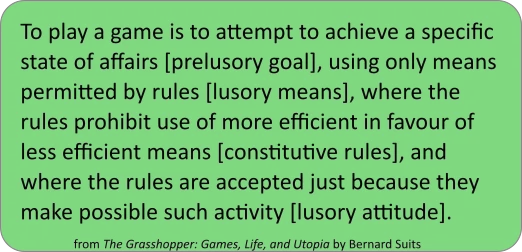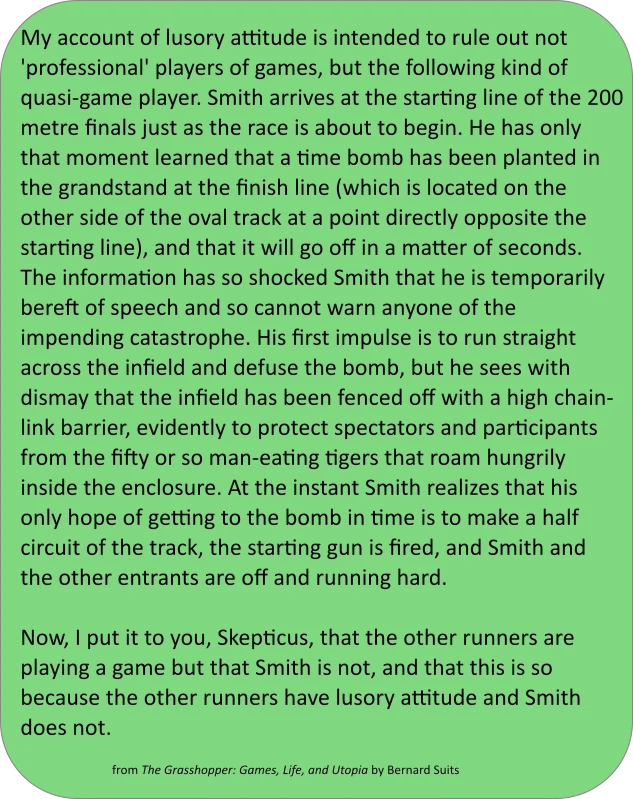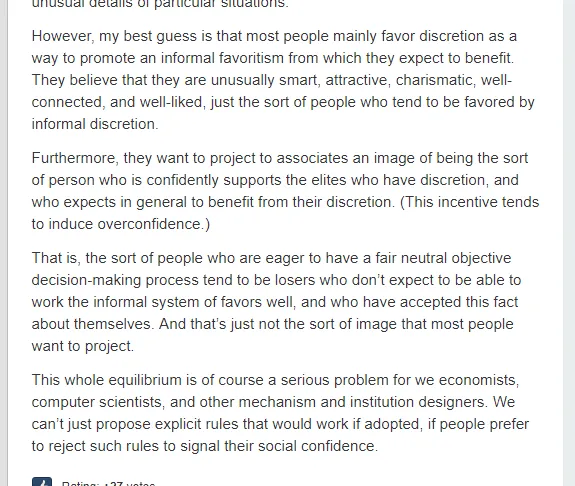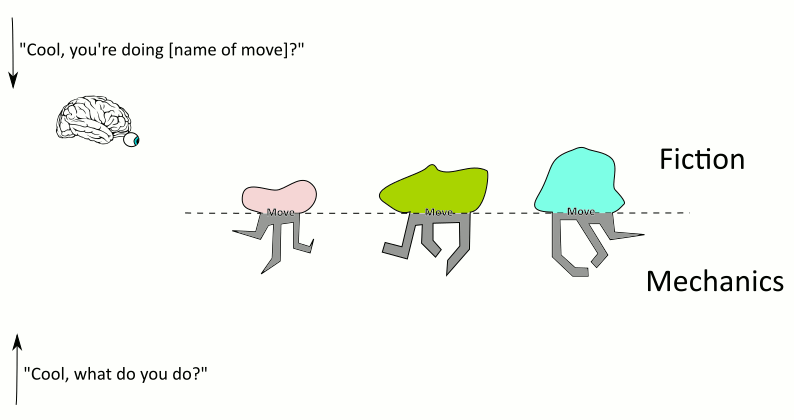During July there was a social media activity under the hashtag #RPGTheoryJuly with a month's worth of daily prompts designed to spur people to talk about RPG Theory, i.e. the field of study (whether amateur or professional) of how games like tabletop RPGs or LARPs work. I mostly contributed via twitter threads. I didn't have something to say for every day, and some days I offered joke answers instead of (or in addition to) real ones, but twitter is a somewhat ephemeral medium and I wanted to collect what I said in a single place, so that's what I've done below. The one that seemed to get the best reaction on twitter was number 26, so if you want to read just one try that one.
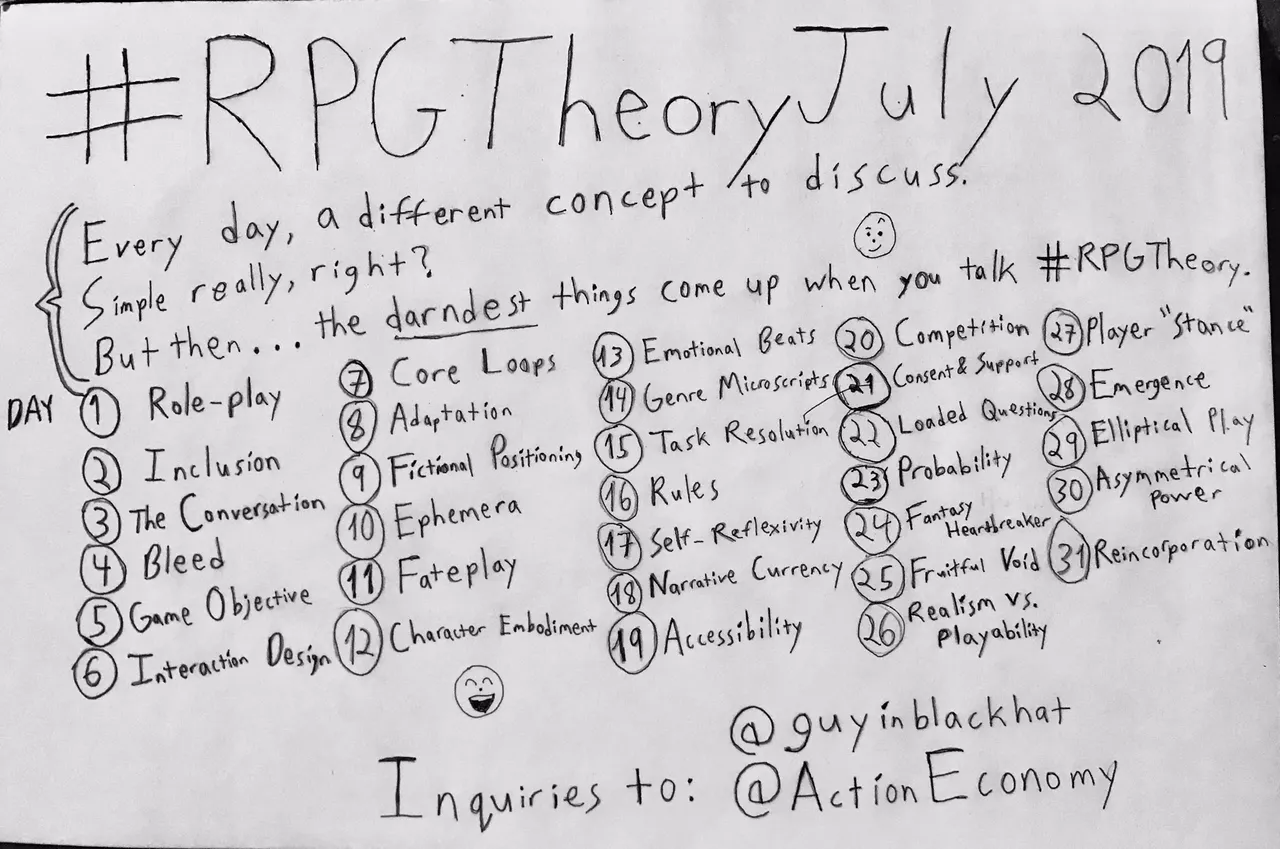
(image from @guyinbackhat on twitter)
"Roleplaying" is interacting with a fictional world through the lens of a particular character. Not all fiction-creating is roleplaying (e.g. Exquisite Corpse stories aren't). Not all character portrayal is roleplaying (e.g. doing an in-character monologue isn't). #RPGTheoryJuly
BTW, whether something is or isn't roleplaying is usually just a category assessment, not a value judgment. Plenty of good and worthwhile things aren't roleplaying, plently of roleplaying can be bad, stupid, silly, etc. It's like saying whether a novel is or isn't a Mystery.
3. Unclear to me why "an RPG is a conversation" is popular metaphor. Same way chess is a converation? If so: true but trivial. Because medium is verbal communication? Dubious to prioritize words/talking over what's going on inside heads w/ imagination+decisions. #RPGTheoryJuly
4. Bleed: a status effect. #RPGTheoryJuly
I'm probably joking. But the real question is whether it's a joke about jargon or a joke about social status hierarchies.
5. Game Objective? I'm dubious that objectives/goals are part of all games. I think of games as processes, "pursue objective" is one possible part that can work in a game, but not only one. Analogy: not all animals have backbones, backbones just one way to do it. #RPGTheoryJuly
I've tried discussing "The object of the game" stuff with Vincent Baker, but he sees things like "follow procedures and see what happens" as valid objects. Seems wrong to me -- that "object" isn't doing the work that an object does in games that actually have them. #RPGTheoryJuly
I think my simple drawing game Four Panels (link: https://www.drivethrurpg.com/product/213259/Four-Panels) has a structure similar to many RPGs -- important thing is the process of building on contributions of others moment-to-moment, not any "object" or "objective" that you're oriented toward. #RPGTheoryJuly
Something can be a game with just procedures. Doesn't mean it has an implicit "object" or "objective". It's POSSIBLE for a game to have an implicit objective, but one shouldn't assume one MUST be there merely to satisfy an arbitrary "all games have objects" rule. #RPGTheoryJuly
Orienting the players the right way is an important thing a game's design must do, so goals, objectives, "the object of the game", are great tools to have in the toolbox because they're good at that. But many RPGs don't use them. #RPGTheoryJuly
6. Interaction Design is a related field to Game Design, but is different. Usually when designing something like a UI for some device the end task and human engagement can be assumed, not always so with game design. #RPGTheoryJuly
Even if you assume that a game is a machine for producing fun, fun is a subjective state inside the player's brain, not some external thing like the output of a word processor or the plowed field of a tractor. A game needs to convince you to engage, guide you how to do so, etc.
Think about stuff like the video game Octodad -- part of the fun of the game is that it's hard to get it to do what you want, which isn't something you'd normally expect from a UI.
As another example, a while back one alleged advantage of nanogames was that the light footprint would make them easy to play. That would seem to make sense from standard UX POV. But for the most part they don't get played. But big, complex games like BW have die-hard superfans.
7. Personally I don't tend to think in terms of "core loops" in game analysis or game design. Yes, there can be looping structures in games, e.g. the classic [win combats to get XP] -> [use XP to level up to get better at winning combats] structure. ... #RPGTheoryJuly
I'm usually thinking more in terms of what the decision-space looks like or what the player should be thinking about in a moment-to-moment way. "Loops" tend to be external over-time abstractions, and are somewhat removed from the actual experience of playing. #RPGTheoryJuly
8. A problem with adaptation, especially in this era of "hacks" and design frameworks, is that people tend to focus on replicating the surface details of a property but don't pay much attention to structure. #RPGTheoryJuly
So, e.g., if you add Middle Earth trappings to a D&D-like game, you'll get D&D in Middle Earth, but not a story that feels like Tolkien. Similarly, wrap a PbtA framework around Middle Earth setting you'll get a character drama in Middle Earth, not a Tolkien story. #RPGTheoryJuly
There's a stereotype that typical StoryGames encode the narrative conventions of a particular genre or media property into their mechanics. IMO there are actually very few games that do that. It's hard to do!
One thing to watch out for when trying to adapt a property to a game is that it's very hard to have non-distorted memories of how a media property works. For example, it's easy to confuse the most memorable aspects for how things TYPICALLY go. e.g. ...
In an old StoryGames thread about adapting Harry Potter, someone advanced premise that Harry Potter magic wasn't easily learned, each spell was associated with an emotional breakthrough and char growth. Uh, no, only one spell was like that, but it was the centerpiece of book 3.
A weird aspect of trying to design an adaptation is that most people willing to engage with it are likely already fans of the source material, so it can be hard to judge reactions in that context, e.g. a playtest might coast along on raw enthusiasm even if mechanics are flawed.
The "adaptation" I'm working on is a "Doctor Who with the serial numbers filed off" game, Getting There in Time. It mostly focuses on the story structure of the classic series, not the arc and drama stuff of the reboot. Unfortunately I'm stalled out on it. (link: https://gamemaru.files.wordpress.com/2019/07/getting-there-in-time-rev040.pdf)
And it's not exactly an adaptation, but my game Final Hour of a Storied Age is a game about the Epic Fantasy literary genre (e.g. LOTR, Wheel of Time, etc.). It's very focused on structure, not trying to replicate the particulars of settings. (link: https://gamemaru.files.wordpress.com/2019/05/storied-age-rpg-rev071.pdf) gamemaru.files.wordpress.com/2019/05/storie…
One other thing re: RPG adaptations: Be wary of mechanical systems that are meant to be a "hook" to remind people of the property. If something is "load bearing" for other reasons may end up awkwardly constrained with respect to gameplay. #RPGTheoryJuly
e.g. Dresden Files RPG has great story about how the refresh/point build system reflects how "bound by their nature" powerful chars are. But unless GM is total hardass compels usually easy and Fate points flow freely. So this theme isn't really reflected in this mechanic in play.
e.g. I didn't play, but in first WotC d20 Star Wars RPG there was a "cinematic" wound point system. But in practice was actually deadlier and less Star Wars-y than regular hit points. But as an allegedly "cinematic" mechanic is was seen as important for adapting a movie property.
Gimmicky systems and mechanics can work, just be careful that you don't ignore other aspects of them just because of the "wow" or "recognition" factor they're delivering for the game as a whole. Sometimes these darlings need to be killed. #RPGTheoryJuly
9. Fictional Positioning
I needed to repost an old blog post for this one, and the tweet-thread version is at the top: see here
10. I'm not sure I have much to say about Ephemera, but I'll offer an observation about ephemerality and the mechanics of FATE: In Fate when you take a hit you mark off a checkbox on your character sheet. This stress track generally resets after every combat. #RPGTheoryJuly
Your current Fate points are long-term. They're usually tracked with physical tokens. In my experience people often spend Fate points to avoid taking stress in combat. I think it's because the tokens FEEL more ephemeral than things written on your character sheet. #RPGTheoryJuly
(The fact that damage is "sticky" in most other games is also probably a factor.) An economics-minded robot would prefer a temporary stress-box hit to a permanent Fate point spend, but most humans seem to prefer spending the ephemeral token to marking their sheet. #RPGTheoryJuly
11. Fateplay is apparently a LARP thing involving play inside a fixed plot framework. I don't know about LARP, and I only skimmed the article, but it seems to have parallels to my game Final Hour of a Storied Age so I'll talk about that. #RPGTheoryJuly (link: https://gamemaru.files.wordpress.com/2019/05/storied-age-rpg-rev071.pdf)
In getting an understanding of the Forge idea of "Narrativist" games it seemed to me that plot-unknowability was prioritized, with the goal of discovering "the story" through play.
That reminded me of one of the two approaches to writing fiction: "discovery" or "seat-of-the-pants" writing, in contrast to outlining. (There was a viral twitter thread about this a few months ago in the context of GameOfThrones and TV writing vs. GRRM's style.)
In fiction writing neither is generally considered "better", they both have pros and cons. So it seemed to me that the "outlining" approach of knowing the broad strokes of the plot and then filling in the "how" during play should be just as valid an approach for an RPG/StoryGame.
In my game Storied Age each character has some plot arcs that they're progressing through, There's a dice mechanic/economy that controls which character gets a "chapter" next, and distributes some mechanical power to the character and their adversity, which feeds into progress.
So basically the timing/order of events, and the particulars of how they happen is figured out during play. (e.g. you know Frodo's plot arc involves fleeing the Shire, but what's chasing him is determined at "run time" not "compile time").
The plot isn't completely fixed, since the Antagonist can technically achieve their goals (e.g. Sauron can conquer the world before Frodo can get the ring to Mt. Doom), but I think it plays differently than typical Forgie games which are often better at soap-opera-esque drama.
Having an appropriate plot is an important part of fitting in the Epic Fantasy literary genre, just having a big sprawling drama could be a good story but wouldn't be Epic Fantasy. So I think my "plot" mechanic is a key element of making my design "about" the Epic Fantasy genre.
12. The time I most committed to embodying a character was when I played The Thing in Marvel Heroic RPG. I intentionally did a gravelly voice with a New York accent. It was fun, and part of that was the idea that in MHRPG you're playing "your take" on a character. #RPGTheoryJuly
That informed some of my design decisions in my "Dr. Who with the serial numbers filed off" game. One of the ideas of Dr. Who is that, via regenerations, different actors portray the "same" character even though The Doctor tends to have a different flavor with each regeneration.
Thinking about that, I realized that the the much-maligned Colin Baker 6th Doctor could be read as really cranking up the arrogance that had always been an element of The Doctor's personality. What I wanted was a way for the nuances of each person's "take" to shine through.
So the mechanics of the game give each char three "traits" that have aspects to them, and all the players and GM are watching for "fictional triggers" related to those character traits/aspects. Idea is to focus attention on where the nuances of "your take" would show up w/ char.
The core idea was inspired by The Doctor's characterization, but that's also just an example of what actors bring to a role, so the mechanics are just as good for the Companion characters.
Unfortunately playtesting with the game has been rocky. I think part of the problem is the common RPG expectation that the GM will "run the mechanics", but there's too much for the GM to do if the players aren't also watching for triggers.
I think that problem is amplified when I'm GM, due to the expectation that a playtest with the designer will be kind of like a demo where they're teaching you the game. But that makes it hard for me to figure out if mechanics are broken, or if they'd work in different context.
Despite possible issues, I think my character system does a good job of delivering "high information density" core characterization players can nuance around. One pre-gen is based on the Brigadier, and two different hadn't-seen-classic-Dr-Who players had very different fun takes.
13. I don't know Robin Laws' "Emotional Beats" system well, aside from some segments on Ken&Robin podcast. Wasn't confident it would be worthwhile enough to justify buying book. Lately I've had a high bar for spending money on RPG stuff, idle curiosity not enough. #RPGTheoryJuly
14. I'm not sure I have a good feel for where "genre microscripts" end and just buying into the premise begins. In CoCthulhu, go investigate weird stuff. In D&D, seek the depths of the dungeon, not safety. If you're playing DitV genuinely try to help the town. Etc. #RPGTheoryJuly
15. In my view, the old Task vs. Conflict Resolution thing tended to be a bit more rhetorical than substantive. When you're making a forum argument it's a lot easier to make claims about what opening a locked door is "really about" than it tends to be in play. #RPGTheoryJuly
If there was general agreement about the size and appropriate scope of conflict then "stakes setting" games would have worked better, not been somewhat abandoned. While some people have a knack for sussing out "good conflicts" it doesn't seem to be a universally intuitive thing.
Additionally, task resolution was always "really" about conflict resolution anyway. Often times people will frame things as "Can I roll to ________?", often what they're after isn't something substantive, they want the game to validate their character vision.
There are elements of characterization that are kind of like "a person who sneaks" or "a person who lies convincingly". Often what people are looking for is for the game to let them concretely demonstrate that element of character in moments when they are "in focus".
So often when a person says "Can I roll to sneak past the guard?" they're not implicitly saying "it would be interesting to me if I failed to sneak past the guard", they're saying "this is the kind of scene where a sneaky guy would do a sneaky thing, and my guy is a sneaky guy."
This is one of the reasons investigative skills work the way they do in GUMSHOE. People aren't invested in "do I learn something by doing an autopsy?", they're interested in saying "my guy is the autopsy guy, it's his time to shine".
Rather than looking at things "top down" in terms of there being some objective set of things that an RPG must be capable of "resolving", I think it makes more sense to think from the mechanics outward -- treat what mechanics do resolve as the important thing, see what follows.
For example, the BurningWheel system makes whether or not you succeed at tasks into virtual branch-points in story, and because people know that's what the mechanics will resolve it primes them to engage in stories where those tasks seem like appropriate pivot points.
PbtA moves essentially do the same thing, tell players what sort of activities are meaningful branch-points in the story. I think this is why a lot of people have trouble engaging with PbtA when they're trying to "translate" from another RPG, e.g. "how do I roll to sneak in DW?".
16. There's a sense in which rules ARE the game. In his book The Grasshopper, Bernard Suits argues that accepting and being bound by the rules is a constituent element of what it means to play a game: #RPGTheoryJuly
While I have issues with the first part of the definition I think it's right about the "lusory attitude". Suits has the Grasshopper character further explain to his interlocutor Skepticus with a thought experiment:
It's exaggerated for effect, but the point is to show that doing the actions associated with a game aren't sufficient to be playing, you mentally have to be engaged with the rules and structure of a game. If you're not doing that you are doing something besides playing the game.
In the RPG world some people seem to mistakenly treat this kind of not-playing as if it's actually an idealized form of play, e.g. I've seen people suggest that in an ideal world PbtA players wouldn't even know the moves, the GM would just activate them when the triggers go off.
Likely stems from idea that there's a mysterious True Roleplaying out there, of which any particular game is but a crude approximation. I think that's wrong: Each game is its own thing, to be played on its own terms, which means following the rules of that game. #RPGTheoryJuly
On the topic of rules and RPGs, when it comes to things like fudging and discretionary deviation from the rules I tend to be skeptical, I'd rather have a system that works than trust people to get better results by overriding and tweaking things on the fly. #RPGTheoryJuly
I don't just feel that way about games, in general I'd prefer a system that works to one based on special favors being handed out. A few weeks ago I saw a link to this blog post and was tempted to mention in in the context of RPG Theory. (link: http://www.overcomingbias.com/2019/05/simplerules.html) #RPGTheoryJuly
Possibly a stretch for today's #RPGTheoryJuly topic, but an excuse to post this animated diagram I created one time to help explain how the "to do it, do it" rule in AW joins mechanics and fiction, doesn't privilege one over the other. (originally here: (link: https://steemit.com/gaming/@danmaruschak/in-apocalypse-world-not-speaking-the-name-of-your-move-is-a-rule-for-gms-not-players) )
On the topic of self-reflexivity in RPGs, I present to you: Wittgenstein's Monster. (link: https://200wordrpg.github.io/2017/rpg/2017/04/15/WittgensteinsMonster.html) #RPGTheoryJuly
When it comes to theorizing (about RPGs, or about anything) you need to be careful not to believe explanations, arguments, or stories that seem compelling but don't turn out to be true. For example, the Forge's "narrative control" phase had a pretty strong story. #RPGTheoryJuly
It went something like this: "When a player says 'I bonk the orc on the head with a club'" what's REALLY happening is the player is making noises and then the orc takes damage. So it would be functionally equivalent if the player said 'a bowling ball falls on the orc's head'".
That sounds plausible. But it turns out that it those two things AREN'T equivalent in play. Acting THROUGH a character feels different than just declaring that things happen. (I suspect because, as social animals, our brains are optimized to look at the world from POV of agents).
(This is maybe a little far from the day 18 prompt, but I'm not sure I have anything to say directly about "Narrative Currency").
19. I have some social anxiety issues. One thing that makes games more "accessible" to me is when I can be reasonably confident I know how to play by reading the rules. #RPGTheoryJuly
20. Competition is a powerful force. Make sure that whatever structures and mechanisms that competition pushes against in your game can bear the load. If you're not careful things can bend or shear off under the strain. #RPGTheoryJuly
For example, in a system where you get bonus dice on a roll for each trait that applies, there's a strong incentive in any situation to argue that each trait applies. Genuine connection to a grounded fictional world can shear under that strain from a different direction.
21. As in political philosophy, most "social contract" stuff is implicit rather than explicit. Making things more explicit doesn't always make them more reliable, could make it easier for a dishonest person to exploit or send false signals. #RPGTheoryJuly (link: https://en.wikipedia.org/wiki/Social_contract)
"Why did your character order a baked potato stuffed with cheese, bacon, and sour cream?" #LoadedQuestion #RPGTheoryJuly
22. The effectiveness of the "loaded question" helps point out that human psychology is an integral part of any RPG system. #RPGTheoryJuly
In Forge terms, the Lumpley principle says: "System (including but not limited to 'the rules') is defined as the means by which the group agrees to imagined events during play." (link: http://big-model.info/wiki/Lumpley_Principle)
But what causes people to agree to something? Let's look at an economic transaction as an example. Underneath anything like sales techniques or explicit bargaining there's the more fundamental factor of what you think the items are worth. You'll buy something that seems worth it.
In an RPG, you'll "agree to" what seems right. This, for example, is where theme, genre tropes, and setting elements are doing "game design" work. If your game puts the characters in a dark and stormy night first they're more likely to "agree to" horror-story type stuff.
This is why I think "how does this get decided?" is usually a much more useful question than "who decides this?". When a GM says something is happening in the fiction it usually isn't "it's true because the GM says it", it's usually more "GM is saying it because it seems right".
Things like rules, the internal consistency of the fiction, etc., are all feeding into that. And yes, rules giving explicit authority to people does tend to lend them credibility, but only to a degree.
It's like in legal system: a judge has the authority to render a sentence, but their credibility doesn't stretch far enough to cover a sentence that's totally disconnected from the facts and law of the case. The authority is conditional on using it appropriately.
HOW a player is making those decisions, and whether the other players find them credible, is the medium that game designers work in. But designers don't have total freedom, some of the building blocks they're working with are already built into human brains. #RPGTheoryJuly
23. I could be wrong, but I think that when it comes to RPG design probability analysis can just as easily provide the illusion of meaningful insight as the real thing. #RPGTheoryJuly
If you analyze a game's dice mechanic and find out that a particular thing happens 70% of the time, do you know if that's good? Do you know if it "ought" to be 60%? 80%? There's generally no external objective standard by which "the math works out" can be evaluated.
Probability math is a powerful tool that can answer questions, but if you don't know what questions you're asking then looking at numbers or curves may just make you feel like you're doing something even if you're essentially in the same place you would have been without them.
You could end up just making arbitrary aesthetic judgments about what curves "look right" or "feel right". That's not bad in and of itself, but I see no reason to privilege it over any other arbitrary aesthetic judgment that goes into a game, e.g. what kind of dice seem cool.
Analyzing mechanics can tell you some things, e.g. if something you thought was common is actually rare or impossible (or vice versa), or if what you intended to be a bonus actually makes things worse, etc. But having precise numbers can't tell you what to do with them.
I feel similarly to "testing for the sake of testing", if you have no idea what you'll learn from a test but want to run it "just to look at the results" you probably shouldn't. The same might be true with probability analysis.
24. As far as I can tell I harbor zero desire to make a "fantasy heartbreaker". I'm not invested in D&D-esque mechanics or D&D's take on fantasy, and I suck at the kinds of things that get people invested in those types of games (e.g. lots of intricate details). #RPGTheoryJuly
The Fruitful Void is the dimension from which Fruit Pie the Magician draws his mystic power. This presents deep philosophical issues that rarely arise in RPGs that use mechanically straightforward fire-and-forget or mana-point magic systems. #RPGTheoryJuly
25. With the "Fruitful Void", i.e. the interesting negative space carved out by a game's procedures that calls to be dived into through play, I think it makes sense as a poetic metaphor. I'm not sure I know if or how it can actually be used as a tool of analysis. #RPGTheoryJuly
26. An interesting psychological phenomenon related to "realism" and RPGs is the "conjunction fallacy" studied as part of the heuristics and biases line of research. #RPGTheoryJuly
Example: "Sheena is a noncomformist with multiple piercings." Ask a group to estimate the probability "Sheena is a grocery store clerk" and another group "Sheena is a grocery store clerk that listens to punk rock music". 2nd group's estimate will usually be higher than 1st.
The more specific and evocative "Sheena is a punk rocker" answer seems more true so estimate tends to be higher, though it should be impossible since the number of punk rock clerks is technically a subset of all clerks.
RPG context: "stunts". "I swing across the room on the chandelier and stab him." If you go with the "realistic" approach of testing success of swinging action then success of stabbing action then overall success rate is low (P[A]*P[B]). But seems like it OUGHT to be high.
What "seems right" to human minds is that concrete, colorful, evocative actions will work well. But that's not always what a technical simulation of reality would say. Verisimilitude and realism can be in tension. What FEELS real can be different from what WOULD BE real.
In order for a game to function players need to stay "bought in". If the game keeps giving results that seem "wrong" then that buy-in can be eroded, making the game less playable. So pursuing realism in a game can be a fraught course. #RPGTheoryJuly
27. Several years ago I was writing a post talking about the orientation players can stand in relative to a game, e.g. aggressively leaning in (metaphorically), etc. But I was a bit flummoxed because "stance" already meant something different in RPG jargon. #RPGTheoryJuly
Eventually I decided that I could call the thing I wanted to talk about "posture" since that word hadn't already been jargonized. (link: https://www.steemace.io/tabletop-rpg/@danmaruschak/tabletop-rpg-theory-concept-posture) #RPGTheoryJuly
28. Ironically enough, I'm finding the "emergence" prompt isn't really inspiring any interesting things for me to tweet about. It seems very flat to me. #RPGTheoryJuly
29. A lot of literary devices, such as elliptical narratives or out-of-order storytelling, are challenging if you try to apply them to an RPG or storygame medium. #RPGTheoryJuly
In order for a game to function all the players need to be roughly on the same page about "what's going on". You can't play chess if the two players don't agree about where the pieces are. You can't play an RPG if you don't agree about what's happening in the fictional world.
RPGs are fuzzier than things like board games, there's not always a concise way to get everyone re-synched. Due to the vagaries of human communication and memory it's not unheard of for RPG players to lose track of which characters are in a scene or where it's taking place.
If you add more complex narrative devices on top of that you increase the difficulty. Additionally, many of these devices use their disorienting nature for their impact, but that can be undercut if a "wait, when is this happening?" type conversation starts.
In a medium like prose, TV, or film it's easier to let go and trust the creator that things will make sense eventually. In an RPG or storygame you're generally a participant in creating the content that makes sense so it's hard to leave as many things "open" as other media.
On a roller coaster you can enjoy the twists and turns because you assume they've been engineered to work properly. If you're driving a car you need to be actively managing how tight a corner you can take, etc.
30. My game FinalHourOfAStoriedAge has some asymmetries in how it allocates resources and attention, but that doesn't translate directly into "asymmetrical power". #RPGTheoryJuly
The game is based on the literary Epic Fantasy genre, so rather than the standard multi-protagonist setup you see in most RPGs it has a protagonist, an antagonist, and supporting characters. Protagonists tend to get more "screen time", but they're a bit more constrained.
I try to tell people that Frodo (protagonist) isn't "better" or "more powerful" than Gandalf (supporting character) in LOTR so there's no "winning" or "losing" in the role assignment procedure, but I think many people are skeptical.
But that system feeds into another one of my unconventional mechanics, which is how the game determines which character is in the spotlight for each chapter. Most games use human judgment for that sort of thing, but mine has a dice-rolling mechanic.
Consciously or not, some "social power" stuff can affect the human judgement that determines focus. Spotlight hogs tend to be enabled, for instance, because they seem like enthusiastic contributors. Even if there's no bad behavior, charisma isn't evenly distributed among people.
What I'm trying to do with the asymmetries in StoriedAge is to make the roles seem different, but not necessarily better or worse. Is it "powerful" to be describing the adversity that the world is throwing at a character, or is it a responsibility that someone must take care of?
If anyone's curious, here's a link to a beta PDF of my game Final Hour of a Storied Age (link: https://gamemaru.files.wordpress.com/2019/05/storied-age-rpg-rev071.pdf)
31. What can I say about reincorporation that hasn't already been said? #RPGTheoryJuly


